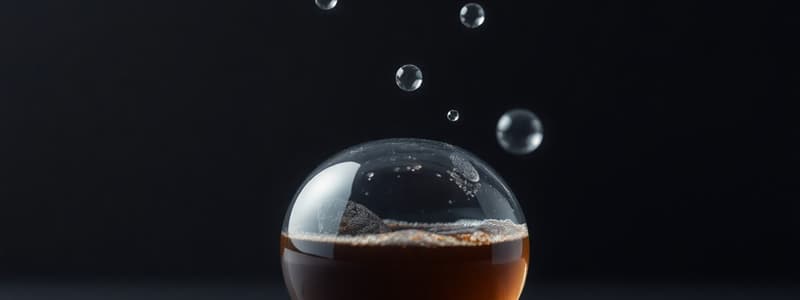Podcast
Questions and Answers
Which of the following is an example of a chemical property?
Which of the following is an example of a chemical property?
- Reactivity of chemicals (correct)
- Color
- Density
- Mass
What are physical properties characterized by?
What are physical properties characterized by?
- They are measured by altering the identity of a substance.
- They do not depend on the amount of the substance. (correct)
- They can change the chemical composition of a substance.
- They provide information about a substance's reactivity.
What distinguishes extensive properties from intensive properties?
What distinguishes extensive properties from intensive properties?
- Intensive properties can be measured without changing the identity.
- Extensive properties provide information about chemical bonds.
- Intensive properties change with the amount of substance present.
- Extensive properties depend on the amount of the substance. (correct)
What is an example of a property that does not have a direct relationship to the chemical bonds of a substance?
What is an example of a property that does not have a direct relationship to the chemical bonds of a substance?
Which of these statements correctly describes intensive properties?
Which of these statements correctly describes intensive properties?
Why is understanding the properties of matter important?
Why is understanding the properties of matter important?
Which of the following statements about chemical properties is true?
Which of the following statements about chemical properties is true?
What would an example of a property classified as extensive be?
What would an example of a property classified as extensive be?
What is the term for the process of a substance combining with oxygen?
What is the term for the process of a substance combining with oxygen?
Which property describes the resistance of a solid to scratching or indentation?
Which property describes the resistance of a solid to scratching or indentation?
What is the ability of a substance to dissolve in another substance called?
What is the ability of a substance to dissolve in another substance called?
Which term is used to describe a substance's ability to burn in the presence of oxygen?
Which term is used to describe a substance's ability to burn in the presence of oxygen?
What describes the tendency of a substance to undergo chemical reactions?
What describes the tendency of a substance to undergo chemical reactions?
Which term represents a measure of how much space something occupies?
Which term represents a measure of how much space something occupies?
What is the gradual destruction of a material through chemical reactions with its environment called?
What is the gradual destruction of a material through chemical reactions with its environment called?
Which property indicates a substance's ability to donate hydrogen ions (H+) in a solution?
Which property indicates a substance's ability to donate hydrogen ions (H+) in a solution?
Which of the following is an example of an intensive property?
Which of the following is an example of an intensive property?
What happens to the electrical conductivity of a piece of copper when it is cut?
What happens to the electrical conductivity of a piece of copper when it is cut?
Which of the following substances is considered a poor conductor of electricity?
Which of the following substances is considered a poor conductor of electricity?
In the context of properties of matter, what distinguishes extensive properties from intensive properties?
In the context of properties of matter, what distinguishes extensive properties from intensive properties?
Which of the following is an extensive property of matter?
Which of the following is an extensive property of matter?
What does heat conductivity measure in a substance?
What does heat conductivity measure in a substance?
Which of the following substances is considered a poor heat conductor?
Which of the following substances is considered a poor heat conductor?
What defines a good electrical conductor?
What defines a good electrical conductor?
Which of the following is not a chemical property?
Which of the following is not a chemical property?
What is flammability a measure of?
What is flammability a measure of?
Which of the following best describes reactivity?
Which of the following best describes reactivity?
Why are chemical properties useful?
Why are chemical properties useful?
Which of the following properties is related to the ability of a substance to burn easily?
Which of the following properties is related to the ability of a substance to burn easily?
What does solubility refer to?
What does solubility refer to?
How is density calculated?
How is density calculated?
Which substance is known to be highly soluble in water?
Which substance is known to be highly soluble in water?
What property describes a material's resistance to scratching?
What property describes a material's resistance to scratching?
Which term describes a substance's tendency to vaporize at a given temperature?
Which term describes a substance's tendency to vaporize at a given temperature?
Which material is characterized by its ability to be stretched into wire without breaking?
Which material is characterized by its ability to be stretched into wire without breaking?
What does viscosity measure?
What does viscosity measure?
Which statement about malleability is correct?
Which statement about malleability is correct?
Flashcards are hidden until you start studying
Study Notes
Properties of Matter
- Properties of matter can be physical or chemical
- Physical properties can be observed or measured without changing the substance's chemical composition
- Examples: mass, density, color, volume
- Chemical properties reflect how a substance will react with other substances
- Examples: reactivity, flammability, pH
Physical Properties
- Solubility describes the ability of a substance to dissolve in a solvent
- Sugar is highly soluble in water, while sand is practically insoluble
- Density is a measure of how much mass is contained in a given volume
- Iron has a higher density than water, which is why it sinks
- Hardness is a measure of a substance's resistance to scratching or indentation
- Diamonds are known for their hardness
- Volatility describes how easily a substance evaporates at a given temperature
- Highly volatile substances evaporate quickly, while less volatile substances evaporate slowly
- Ductility is the ability of a substance to be drawn into a wire without breaking
- Many metals are ductile
- Malleability is the ability of a substance to be hammered or rolled into thin sheets without breaking
- Metals are commonly malleable
- Viscosity is a measure of a fluid's resistance to flow
- Honey is more viscous than water
- Heat conductivity is a measure of a substance's ability to transfer heat energy
- Metals are good heat conductors
- Electrical conductivity is a measure of a substance's ability to conduct electricity
- Silver, gold, and copper are excellent electrical conductors
Chemical Properties
- Flammability is the ability of a substance to catch fire and burn
- Reactivity describes the tendency of a substance to undergo chemical reactions
- Sodium reacts violently with water
Intensive vs Extensive Properties
- Intensive properties depend only on the type of matter, not the amount
- Examples: density, color, melting point, electrical conductivity
- Extensive properties depend on the amount of matter present
- Examples: mass, volume, length
Studying That Suits You
Use AI to generate personalized quizzes and flashcards to suit your learning preferences.




